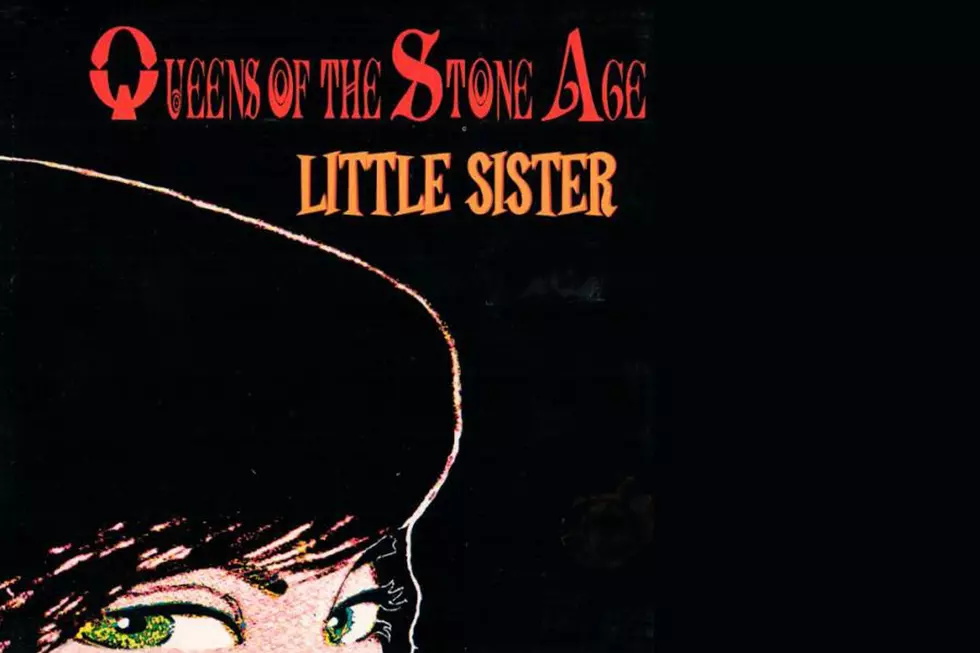
How Queens of the Stone Age Almost Left ‘Little Sister’ Behind
“Little Sister” was almost left behind by Queens of the Stone Age.
Hearing it now, it feels like a minor miracle of mid-'00s rock, a deceptively fleet-footed and brisk odyssey through the innuendo of a typically provocative set of Queens of the Stone Age lyrics. But its confidence hides its origins in an era that saw the band nearly disintegrating.
The thrill of fronting Queens was beginning to fade for Josh Homme following their third album, Songs for the Deaf. He was considering burning the whole thing down.
Songs, released in 2002, was a breakthrough, the kind that elevates a band from mixtapes to car commercials. Its concept -- built around listening to the radio while driving through the California desert -- was based on bassist Nick Oliveri's assessment that, "We don't get played on the radio, so I figure we should talk shit about them." Of course, it was a different story after the release. No rock station worth its advertising was going to skip out on “No One Knows” or “Go With the Flow.”
What became “Little Sister” had originated during that record's sessions, but never made it beyond the demo stage.
Listen to the Demo of "Little Sister"
With success came greater challenges. Homme and Oliveri, childhood friends who led the '90s rock band Kyuss, had reached the point of selling out, a horror familiar to any artist steeped in the punk ethos of the '90s. But Homme, as always, focused on the music.
"[Queens] was about dropping the punk rock guilt." he said in one interview, and, "I don’t care if it’s big or small, you know?'" in another.
Greater problems brewed from within the band. Oliveri, the bassist whose chemistry with Homme drove Songs into the Top 20 of Billboard's albums chart -- their highest placement to date -- and earned them their only gold record in the U.S., had been fired by him before, in the days of Kyuss. Here, in 2004, he was fired again.
"I understood he was going to get fucking mad," Homme told The Guardian. He would insist there was nothing personal to the split. "But playing music is above friendship. Music is something that's bigger than you are."
More detail came with a contentious Zane Lowe interview, where he said that "the reason I fired Nick was because I found out he was beating up his girlfriend... and that's basically what it is." He also claimed to have said years before, "If I ever find out this is true, I can't know you, man."
Oliveri, years after the fact and eventual reconciliation, would say, "I'm not in denial that maybe I deserved it. ... I have a hard time still dealing with it at times."
Between Oliveri’s departure and sometimes-vocalist Mark Lanegan taking time off to tour with another group, Homme was faced with difficulties in how to continue the band, especially with no returning members for the next album (although Lanegan would provide some additional vocals on a couple of tracks, including single "Burn the Witch"). He certainly wouldn’t be able to get Dave Grohl to show up and play drums again.
Luckily, Queens of the Stone Age was never beholden to one lineup as much as to Homme’s will, and he would create a new lineup and discover something new to inspire him.
Inspiration emerges from different sources. In this case, Homme would have to reckon with success found. The fairytale happy ending for which many bands reach had been achieved, and then, brutally, stolen. He found a parallel in the darker stories of the Brothers Grimm.
"They're not like modern fairtyales where they all live happily ever after," he told The Guardian. "They're warnings. Don't go in the woods. Listen to your parents."
Indeed, Lullabies to Paralyze is loaded with a strange and fantastical darkness that marks it as different from Songs for the Deaf and Rated R. There are horns courtesy of the Disney Main Street Marching Band and even a Tom Waits-esque waltz to kick the whole thing off.
But there's also a rock and roll core to the album that harks back to their 1998 self-titled debut, the last one Queens had done without Oliveri. And at the core is "Little Sister," maybe one of the best pure pop songs the band ever recorded.
Running just under three minutes, the song is as slick and uptempo. It zips by, buoyed more than anything by a cowbell-like jam block and a repetitive, hypnotic guitar lick. It never feels like the product of a long development period.
Even the song's vocals even seem to slide by, as if Homme has crafted a commercial Trojan horse around a poem about the seduction of a girlfriend's younger sister.
It’s a familiar story, one as old as rock and roll. The original "Little Sister," a 1961 hit for Elvis Presley, was the product of the writing team of Doc Pomus and Mort Shuman, and an instantly iconic track of innocence lost and budding sexuality. Its blend of cool, delicate percussion with smoking guitar work courtesy of Hank Garland helped it linger in the minds of future rockers like Robert Plant and Pearl Jam, who have performed it in concert.
Watch Robert Plant and Rockpile Perform "Little Sister"
While Josh Homme didn't intend to cover it, he wanted to put his own spin on the same narrative, accentuating the sexuality by removing the three-verse beginning-to-end structure here. Homme focuses on imagery: the boy outside the girl's window, deep and intense and (so far) unconsummated, lust, opening up, doing wrong. The mood blows up in a non-verbal second half owned by virtuosic soloing, and every listener knows what's happening.
It's lucky for all involved, the band and the audience, that the song was brought back from the Songs for the Deaf days.
Amid the dark and occasionally depressing world of Lullabies to Paralyze, "Little Sister" is a lamppost, playfully ambiguous in its story (which, without the context of the Elvis cut, leans incestuous), and a strong, lean rock track, recorded in the studio in one take.
The band must have known what they had with "Little Sister," because it became the first single to be released from the album, sealing the deal on its success, and more importantly, showing the band could survive the blows of too-public falling-outs and lineup turnover.
"I'd rather bet on the music than anything else. I like to make the music that I really love," Homme told Pitchfork. By humbling himself at the “altar of music,” as Homme called it, the bet that paid off.
Top 100 Albums of the '90s
More From Diffuser.fm










